The Information Warfare: Unpacking China's Global Media Influence

The United States State Department has raised alarms over China's multi-billion-dollar year over year investment in shaping worldwide perceptions and disseminating disinformation. Through a comprehensive global information manipulation drive, Beijing is said to be strategically curating a favourable narrative around its policies and the governing Communist Party.
According to the State Department spokesperson, there is an increasing trend where Beijing invests heavily in an information ecosystem adept at promoting propaganda while facilitating censorship and the spread of disinformation. This initiative is cited in the Global Engagement Center’s report and underscores a worrisome trajectory that could potentially jeopardize global freedoms.
The Architecture of Influence
The report delineates the methods by which Beijing aspires to manipulate the international information sphere. Utilizing techniques such as coerced partnerships, manipulative media strategies, and overt control of Chinese-language outlets, China aims to 'bend the global information environment to its advantage.' These efforts are not only targeted towards external perception but also serve to control the narrative within China itself, as reflected in their heavily regulated online space.
Beijing's influence is felt across various social media platforms, including GOOG, where they have significantly increased their presence. The discussions and debates on critical issues such as Xinjiang, the South China Sea, and Taiwan are being shaped to reflect China's stance. Internationally, state media have established partnerships with various news organizations, effectively turning them into conduits for Chinese state propaganda.
Manipulation Beyond Media
The GEC report goes on to unravel the depth of Beijing's international media strategy with its five pillars: propagandist operations, advancement of digital authoritarianism, leveraging international organizations for favourable outcomes, dual tactics of co-optation and pressure, and the stringent control over Chinese-language press.
The campaigns extend far outside the confines of traditional media, infiltrating technological hardware as well. Revelations about remote-activatable censorship capabilities in smartphones manufactured by Chinese companies highlight the lengths to which China will go to maintain its narrative dominance.
US officials express concern that such ubiquitous manipulation capabilities could set a precedent for what they term a 'community of digital authoritarians', where surveillance and smart city systems are exported globally, thus widening the reach of China's influence apparatus.
Countermeasures and Global Stance
Amidst rising concerns over privacy and security, several countries, including the US, have imposed restrictions on Chinese technology giants such as Huawei, wary of potential backdoors that could serve Beijing's surveillance and informational dominance. Despite Huawei's denials of any compromising ties, the shadow of doubt has influenced global policy decisions around the adoption of Chinese technology.
disinformation, censorship, propaganda